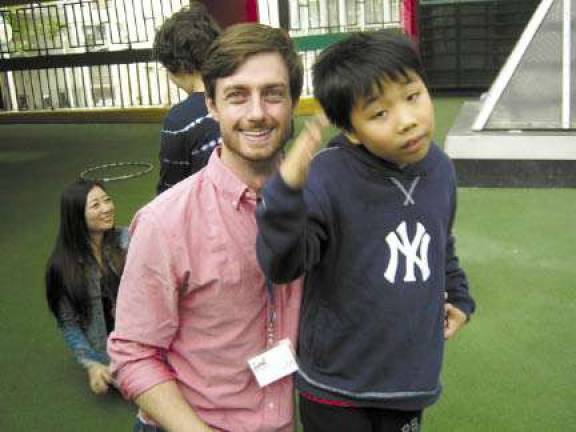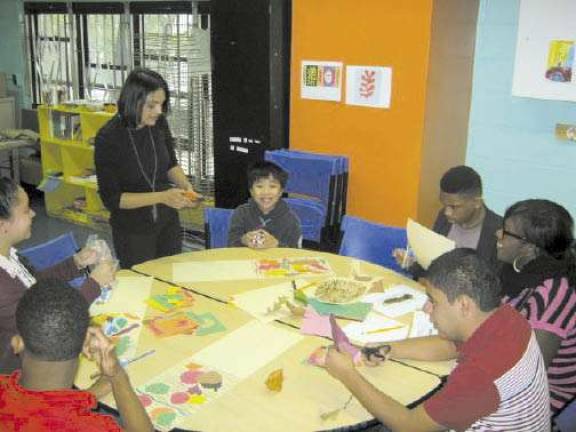Special Needs Program Helps Kids Have Fun


A program designed by a local mom for her son helps other families with special needs children
At a recent school dance, Jonathan Donin, 17, kept dancing after the music stopped. For some kids, this might not seem like such an unusual thing to do; but because Jonathan has Pervasive Developmental Disorder, his mother, Dr. Roberta Donin, was called and told to come pick him up immediately.
She's faced similar issues when trying to find extracurricular activities for her son, and, frustrated with the lack of options available, she decided to create her own program, and Sparkidz was born.
The Saturday-only program offers children a place to stay and engage in activities all day long, minus their parents. Just one month old, the non-profit makes activities available to children ages 8-18 at the Lincoln Square Neighborhood Center every weekend, and hopes to expand to after-school programming soon.
Dr. Donin, a geriatric care physician at New York-Presbyterian and medical director of the non-profit The Shield, says that while most kids have opportunities every day of the year to do things like ice skating, piano lessons and going to dances, special needs children often don't. "They're just not included. They're viewed as though they're too much trouble, even if they're high-functioning," she said.
Sparkidz are given the opportunity to participate in more mainstream activities that they normally might not have a chance to. Kids can participate in cooking, performing arts, visual arts, sports, yoga, dance, and technology, all of which are designed to help enhance their self-esteem and offer them positive experiences.
One big plus that makes the program unique: parents don't have to worry about leaving their child for the entire day, since there is a one-to-one ratio of child to trained teachers.
"Most programs require parents to sit there the whole time, because they want you to be available if anything happens. Now, this gives me my own time on a Saturday," said Stuyvesant Town resident Gina Horton, whose 15-year-old son Leo attends Sparkidz and goes to Cooke Center Academy. "He's growing up and wants to go out into the world. He wants to be able to be away from mom, and they give him the chance to do that."
Last Saturday morning, kids engaged in an art class accompanied by live music. "We want to have live music everywhere in every room. These kids love singing and dancing," said Dr. Donin. Her son, Jonathan, who is turning 18 years old this week, introduced himself immediately as the cool handshake guy.
"My mom did an awesome job. It's fantastic. I'm really enjoying it," Jonathan said as he worked on an art project involving colorful leaves and glue sticks. Nearby, art teacher Avani Patel asked 10-year-old Gordon Lin, who has autism, to identify what color his construction paper is. "Yellow! Yellow!" He exclaimed. She cooed. "Wow, that's right!" Gordon then took Patel by the arm and kissed t, twice, rubbing his head gently against her affectionately.
"He gets so excited on Fridays because he knows he's going to see his friends the next day. He skips around our apartment and on the subway," said Gordon's mother, Jiepingo Lin. "He participates every minute here, and that not the experience we've had with different groups. I can see his excitement, he's so eager to come."
What's especially helpful for parents is the advice they receive from the teachers, professionals who come from schools like Cooke Center Academy and the Rebecca School, on what to do at home and after school in order to support their kids in the best way possible.
The Sparkidz curriculum is designed to help kids develop self-awareness, assess their own feelings and values, regulate their emotions, overcome obstacles, deal with stress, and achieve their own personal goals. Highly trained staff works to help kids relate positively to one another, form healthy relationships, and learn how to make good decisions for themselves.
"Autistic children have to be able to take direction from other people besides their mothers, and he's taken direction from all of different teachers here," explained Horton. "They're keeping him active. I mostly see him tired when he gets back, because he's had a full day, and he's happy. All of the kids here are interacting, and, at other places, they're just sitting quietly at a table."
Currently, Sparkidz is working with homeless shelters to bring in kids from temporary housing facilities into the program.
"The Department of Education has a whole bunch of kids who aren't privileged and who need and want this support, and its miraculous that they're supporting us here," said Dr. Donin. "Most kids in the shelter system don't get diagnosed or receive any early intervention."
So far, the Department of Education has agreed to financially support 10 students from the shelter system, and the center hopes to expand to make room for 20 by February. A half-day of programming is $50, and a full day is $100. Still, the tuition for SparKidz barely covers their daily costs, according to Karen Murk, the program's executive director. "That is why we have been fundraising. All the income goes directly into the business. No money is profited," she said.
Parents like Lin say that the cost is well worth it, though, and that the program has improved their lives dramatically in just four short weeks.
"Because of his language problem, it's hard for Gordon to communicate with other kids, but people here understand him," said Lin. "This program has changed my life and Gordon's life. We are both happier for it."